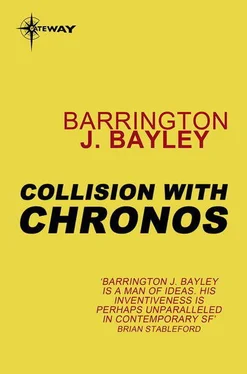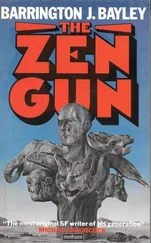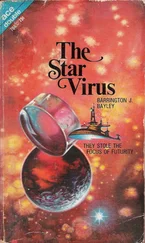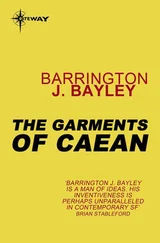“Taking account of the possibility that the prisoners might be made to reveal the whereabouts of the Sarn Establishment, I immediately ordered the dispersal of its activities around the globe and the rapid building-up of our time travelling capabilities. With a determined allocation of resources, it was possible to bring to completion about twenty apparatuses and in the ensuing weeks a good start was made toward a more complete exploration of our time environment.
“Early on, one of the time machines was fired upon while in flight and destroyed. I had, however, given orders that the machines were only to travel in squadrons of three or more. The victim’s companions gave chase to its attacker and pursued it into the future, where they lost track of it. Later, more signs of the aliens’ presence were found, and revealed a situation of utmost danger. It seems that the aliens are extremely active in time, not only in the past, and in our present, but in the future also.”
“The future, Leader? But how can that be?” One of the burly Titan generals, a man in his sixties, turned to Limnich in puzzlement. He was like many of these older Titans who had been born and bred in the deviant wars. His life had been one of conquest and heedless force, and he had difficulty in understanding these abstract concepts.
Limnich himself recognised his generals’ limitations in the context of the modern world. Some of these old-time soldiers, he told himself, would have to be phased out. They would need to be replaced by younger men of greater sophistication. Men who understood theory, as well as the necessity for action.
“There is increasing evidence that the enemy has established a massive base some centuries in the future,” he replied. “Presumably he believes himself to be out of the reach of retaliation there – but he is wrong! ” His pale fish-like features suddenly burning with passion, Limnich thumped the table with his fist. “Gentlemen, what I am trying to tell you is that we must once again put ourselves on a wartime footing. The second confrontation with the alien, which we have suspected would come one day, is imminent.”
And the gleam of excitement that followed his words swept aside any incomprehension that might have bedevilled the Titanium Council. Here was one thing they did understand – and gloried in.
War!
“You will set to work in all your sectors to bring industry up to the pace of wartime production,” Limnich told them more calmly. “Specific blueprints will be issued shortly, when we’ve trained sufficient technical teams in the new science of time manipulation. I’ve already taken the steps that will lead to the creation of time travel equipment on a large scale. This will result in new battalions being raised for the Titanium Legions: battalions trained and equipped to wage war across the centuries.” He paused again, and launched into the evocative language he could never resist on such occasions. “Mother Earth is once again calling her offspring to her defence. We must gird our loins, muster our strength, and strike before we’re overwhelmed by the alien onslaught that we must assume is being prepared. There’s no time for rest: we’re entering upon a new era of conflict.”
Limnich rose to his feet, paused with dignity while the assembly too, rose, and arms shot out, hooking themselves with clenched fists in the Titan salute. Then, without a further word, he turned and walked quietly from the chamber.
Up until the second day the inevitability of death was something Heshke’s mind had been unable to encompass. Stubbornly his thoughts had kept running in the same grooves as before, as though he were going to continue to live.
The second day was when their water ran out. The Titan tech officer, Lieutenant Gann, had suggested that they go searching for more, but Leard Ascar had ridiculed the idea.
“What for?” he sneered. “We’ll probably find water – but one thing we won’t find is food. We’re on a dead planet.” He stroked his pistol. “I’ll tell you what I’m going to do. When I start to get too thirsty I’m using this.”
And yet, though Ascar constantly licked his dry lips, his voice became cracked and he complained plaintively of thirst, he still had not killed himself. Heshke believed he knew why: the man’s incredible brain was still at work, determined to wrest as much knowledge as possible from the enigma of time before he died.
They had dug a shallow grave to bury the dead Titan and now sat in the shade of the wrecked time traveller, talking desultorily. At first Lieutenant Gann had dwelt on the failure of their mission; but Ascar reassured him.
“It will only be a matter of weeks before they start sending out more probes. The truth will come to light. They’re a thickheaded group, but it will penetrate in time… to start preparing for the holocaust.”
Heshke shivered at the other’s matter-of-fact acceptance of the calamity to come. “Then what chance have we of being rescued?” he enquired.
“None; don’t harbour any hope on that score. They’ve got a whole planet and centuries of time over which to look for us. It’s impossible.”
“But they will find the alien civilisation?”
“Yes. Not as quickly as we did – it won’t occur to them the way it did to me – but yes.”
“But they might get shot down the way we were.”
“Probably the first few will. Then they’ll realise what it’s all about, send out armed machines, and so on.”
Lieutenant Gann came into the conversation, speaking in a hollow voice. “What we’ve discovered is almost too horrible to think about. This head-on collision you speak of – it’s incredible! Are you sure, Ascar?”
“I don’t understand it at all,” Heshke admitted. “What are they, a time travelling civilisation? Have they found a way to make their whole society travel in time?”
Ascar shook his head. “It’s even more than that. It’s a whole biota – a world of biological life – that’s unconnected with our own. I think it’s a natural phenomenon, not an artificial one. Plainly, our own present – our own time-stream – is not unique. There are two of them – at least two – sweeping toward one another through four-dimensional space. When they meet it will be like God clapping his hands together, with all living creatures caught in the middle.…”
“You make it sound like the end of the universe!”
The physicist shrugged, then sighed. “Probably not. The end of time, maybe. I don’t know; I just can’t figure it out.”
“Something else bothers me,” Heshke continued after a pause. “The other civilisation is supposed to be only four centuries away from our own. But from the state of their remains, such as the Hathar Ruins, I would say they were definitely abandoned more than four centuries ago. It’s hard to date these things, but an age of eight hundred, maybe even a thousand years, would strike me as more reasonable. It’s an anomaly.”
Despite his discomfort, a weird smile came over Ascar’s features. “As a matter of fact that was one of the clues that turned my mind in the right direction. There are two ways that things can decay. They can decay with the progress of the Absolute Present – just normal entropy. But there’s another kind of decay: the decay that sets in beyond the margin of the travelling time-wave – decay in non-time. Where the constructive forces of the present moment leave off, decay sets in. And at first entropy acts much more rapidly than in the present. So as you travel into the future things are falling to pieces very quickly. That’s why living forms vanish altogether, for instance.”
They all pondered his words. “Of course,” Ascar added casually, “as the now-wave draws closer things magically reconstruct themselves, as it were.”
Читать дальше












